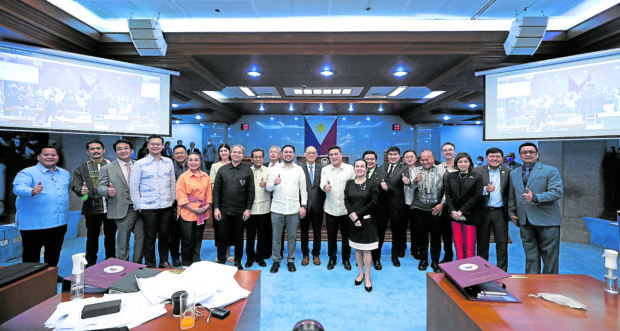Maharlika bill moves forward, but still not sent for President’s approval

DONE IN JUST 6 MONTHS Senate President Juan Miguel Zubiri poses with other lawmakers and members of the economic team after the Senate’s marathon session in May that ended with the passage of Senate Bill No. 2020 creating the Maharlika Investment Fund. The bill, introduced in the House in November last year, is expected to be signed into law by President Ferdinand
Marcos Jr. before his second State of the Nation Address on July 24. Senate PRIB / file photo
MANILA, Philippines — Despite the swift approval of the Maharlika Investment Fund bill in Congress, the controversial measure is still not yet on the table of President Ferdinand Marcos Jr. for his approval.
The past few weeks have been filled with talks on how Congress can amend the conflicting sections in the version of the Maharlika bill that was approved by the Senate on third and final reading, and adopted by the House of Representatives.
Senate Deputy Majority Leader JV Ejercito on Tuesday said that a clean version of the Maharlika bill now awaits the signature of Senate President Juan Miguel Zubiri.
“I know the enrolled copy of the bill is already ready for the signature of the Senate President, and after which, it could be transmitted to Malacañang. So that’s the latest update that we got,” he told reporters at the Senate.
According to the Senate website, an enrolled bill is the final copy of the proposed measure, which had been certified as correct by the Secretary of the Senate and the Secretary General of the House of Representatives. It must also be signed by both the House Speaker and the Senate President.
Article continues after this advertisementEjercito said Zubiri is still in Washington for official business, so Senate Secretary Renato Bantug Jr. may “bring it” to him to secure his signature.
Article continues after this advertisementWhen asked about the errors in the provisions of the Maharlika bill, Ejercito said those have already been dealt with.
“That’s why it took a while. They fixed it first. [They] made sure to clean the bill before it can be forwarded to Malacanang,” he said partly in Filipino.
Ejercito, however, has no information about how the Maharlika bill’s conflicting provisions on the prescription period for the prosecution of crimes were resolved.
This refers to Sections 50 and 51 of the measure, which sets the prescription period at 10 years and 20 years, respectively.
‘The least Senate can and should do’
Senators Sonny Angara and Risa Hontiveros seem to not be in the loop on the developments in the Maharlika bill.
In separate interviews, they both appeared to have only found out about the status of the measure when members of the media asked about it.
Hontiveros said she is unsure if and how the clashing sections of the Maharlika bill were fixed.
“I also don’t know how it can be fixed when it was approved by the Senate on third and final reading, with two provisions on the prescription [period]. And if the two different provisions already passed in the bicameral conference committee meeting, I can’t seem to think of how this could have been corrected,” she said.
But, she said, more than its content errors, there is also a need to address the measure’s “substantive flaws” and “fundamental cracks.”
The opposition lawmaker backed the bid to recall the Maharlika bill to the Senate, so it can undergo the proper legislative process in accordance with the chamber’s rules.
Even if it is returned to the Senate floor, Hontiveros noted, the two-member Senate minority bloc will still oppose the Maharlika bill.
“But isn’t that the least the Senate can and should do? To do our job in adherence to the proper legislative process and the rules of the Senate,” she added.
Only Villar can answer
Angara, who voted for the Maharlika bill, said it is not within the power of the Senate and the House secretariat to delete provisions in the Congress-approved measure.
He said only Senator Mark Villar, who sponsored the bill in the Senate, and his banks, financial institutions and currencies committee can do such a task “but it has to be clear on the floor.”
“I think only Senator Mark can put an end to this debate by saying what was the intent of the committee. If he says their intent is one prescription period of 10 years, that’s it. The debate ends there,” Angara said.
Reporters have constantly sought updates from Villar’s office about the status of the Maharlika bill.
But its latest update to the media was on June 13, saying the measure had not yet been transmitted to Malacañang.
The Maharlika bills in the Senate and the House were certified as urgent by Marcos, who had once said the investment fund was his idea.
This, in effect, allowed both chambers to forgo the three-day period between bills’ second and third reading, as mandated by the Constitution.
RELATED STORIES:
Congress OKs Maharlika bill without pensions as funding
Senators warn Palace vs changing law on Maharlika Investment Fund
Serious errors committed in approving Maharlika bill – Escudero